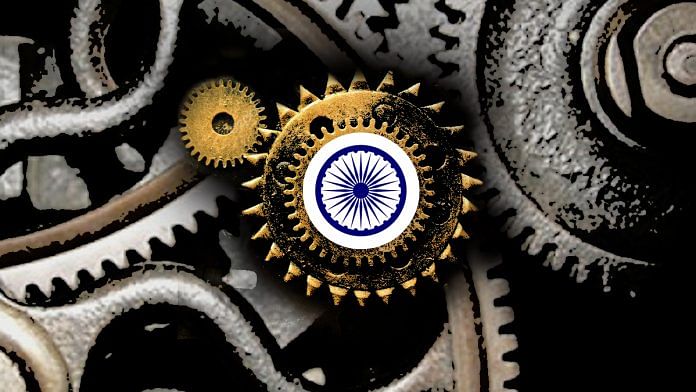India is not a frontrunner in the emerging digital-physical world, but Indians are beginning to make their contribution.
Speaking earlier this week at the inauguration of something called the Centre for the Fourth Industrial Revolution (4thIR), the Prime Minister said that India’s contribution to 4thIR would leave the world “stunned”. He added that India was moving from “local solution” to “global application”. Now, the world is not easily “stunned” when the everyday reality is rapid developments in the broad area of 4thIR. Put that down to Narendra Modi bombast. But he may have a point that is worth exploring.
4thIR is an umbrella term that includes everything from the Internet of Things and Artificial Intelligence to 3D printing and blockchain, and from specialty materials to autonomous vehicles and 5G communications technology. In essence, it brings together digital technology and the physical world to create a new range of products and services. As should be immediately clear, India is not a frontrunner in most of these areas. But India and Indians are beginning to make their contribution to the emerging digital-physical world.
 For starters, India heads the list of the top 10 digital nations, according to the Tholons Services Globalisation Index. That rank reflects, among other things, the country taking global leadership in the use of mobile data (thanks mostly to Reliance’s Jio), Aadhaar’s success in giving every resident a unique digital identity, and RuPay’s rapid growth and acceptance when compared to the stodgy performance of global card companies like Visa and Mastercard. The features of these platforms are low cost and massive scale, precisely the combination that defines most Indian markets.
For starters, India heads the list of the top 10 digital nations, according to the Tholons Services Globalisation Index. That rank reflects, among other things, the country taking global leadership in the use of mobile data (thanks mostly to Reliance’s Jio), Aadhaar’s success in giving every resident a unique digital identity, and RuPay’s rapid growth and acceptance when compared to the stodgy performance of global card companies like Visa and Mastercard. The features of these platforms are low cost and massive scale, precisely the combination that defines most Indian markets.
Such platforms can be used to offer products and cloud-based services to citizens and consumers by governments and businesses. The overwhelming majority of the 10 million businesses registered with the GST (goods and services tax) system don’t have access to institutional credit. The new technologies, data platforms like the GST Network and the Corporate Identification Number system, along with interventions like the Reserve Bank’s support for a Public Credit Registry, make it possible to radically improve the transparency of the financial system. That means small businesses without either a credit history or assets to offer as collateral can get credit on the basis of their cash flow. The result could be transformative for millions of small businesses.
Also read: India’s software exports are not the answer to the rising oil bill
If cloud-based platforms can be put in the public space, new businesses could build on them — as Uber has done with the Global Positioning System (GPS). The remarkable volunteer-driven Bengaluru firm iSpirt is working on a platform for medical application. As iSpirt’s Sharad Sharma explains, businesses that build on such platforms that offer low cost and large scale could facilitate success in 4thIR in a way that India failed to achieve in earlier manufacturing avatars. Digital-only banking is already reality, while the cloud-based Zoho business software package, offered by a Chennai firm, offers small businesses affordable pay-as-you-go business software solutions that are precluded by the heavy upfront cost of, say, Oracle.
Strategic (critics would say nationalist) calculations underlie some of the work being done. One assumption is that lack of control of key data platforms could be a national vulnerability in conflict situations — the main reason for pushing data localisation as policy in the teeth of US opposition. The development of the satellite-guided Navic system as an alternative to the US-promoted GPS is another result of such thinking. There is also a growing temptation to copy China where it is not too late. Beijing kept Google at bay while developing its own Baidu search engine, and also kept out the international credit cards while pushing its own UnionPay. Could access to the domestic market be leveraged in other areas, without losing efficiency, as China did with electric buses? We have to wait and see.
Also read: With all the economic gloom and doom, this is India’s sunrise sector
A subsidiary thought is that platforms developed for addressing domestic challenges could be suitable for countries in, say, Africa, which might find the established western alternatives too costly for their consumers or not suitable for their small businesses. The World Bank gave Morocco a loan last year to roll out a unique identity system based on an upgraded Aadhaar. As Modi said, local solution to global application.
By special arrangement with Business Standard




Yes low cost & high volumes has made the Business to flourish not only domestically but attracting the Global investors. All these years the Global & local Business community are worried about the Corruption at high places & lack of Transparency. Now certain actions like Aadhar & GST implementation has taken care of these aspects. Especially linking PAN to Aadhar will bring much transparency to Business activities. support lending based on cash flow. While I was negotiating for a car loan, one of the Businessmen was openly arguing in a Car Loan Mela about his eligibility to get a car loan as he has reflected a negligible profit in his IT statement as such his profit & cash flow is multiple times than reflected in his filled IT Returns.
But government must have a proper system in place in securing the Data s & monitor constantly the system by plugging its loopholes. After the ruling of the SC now all the politicians & Business Community will fall in line.
Thanks for a good article which throws a positive & possibility light on 4th IR.
India’s obsession with socialism will prevent next industrial Revolution.